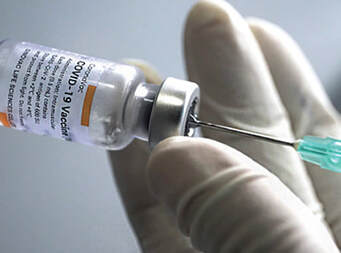VACCINES: Relief and Protection
Wearing masks and respecting social distancing are practices that help reduce the likelihood of exposure to the Covid-19 virus, or spreading it to other people, but these measures are not enough. The vaccines will act on the immune system of the person so that it is in a position to fight the virus if someone is exposed to it.
Getting vaccinated and following the Centers for Disease Control recommendations to protect yourself and others will offer the best protection against Covid-19. Many people are looking forward to getting vaccinated against Covid-19, but others, understandably, have questions about the vaccination process and what to expect when their turn comes. Health experts provide information on this process as well as tips on what to do before, during, and after receiving the vaccine. Before getting vaccinated: There is a lot of misinformation on the internet about vaccines, so it is important to consult reliable sources such as UNICEF and the World Health Organization. If you’re not sure if you should get vaccinated against Covid-19, talk to your doctor. Currently, people who are in the following situations are discouraged from getting vaccinated against Covid-19 to avoid possible adverse effects: • If you have ever had severe allergic reactions to some of the ingredients in the Covid-19 vaccine. • If you are sick or have any symptoms of Covid-19 (in that case, you can get vaccinated once you have recovered if your doctor gives approval.) • If you have ever had a severe allergic reaction to a vaccine or if you have questions about any medications, you’re currently taking, check with your doctor before your appointment. • Take care of yourself. Get a good night’s sleep and stay hydrated before getting vaccinated in order to feel your best that day. During the appointment: • Protect yourself. Don’t forget to take the safety precautions at the center where you get vaccinated, such as keeping your physical distance while you wait and wearing a mask. • Communicate. Inform the professional of any illness or condition that may require additional precaution; for example, if you are pregnant or have a weakened immune system. • Keep your vaccination record. You should receive a card or certificate stating the Covid-19 vaccine that has been administered to you, the date you received it, and the place where you were vaccinated. Keep this card in a safe place in case you need it in the future. After getting the vaccine: • Stay a while to verify that you are okay. Your healthcare professional should watch you for 15 minutes after the vaccine is given for any immediate reaction. However, it is very rare for serious reactions related to the health and integrity of the vaccinated person to occur. • Prepare for possible side effects. Vaccines are designed to provide you with immunity without exposing you to the danger of contracting the disease. Although it is usual to generate immunity without a reaction, it is also common for mild or moderate side effects to occur that disappear on their own within a few days. • Here are some mild or moderate side-effects you may feel after receiving the vaccine: Pain in the arm, mild fever, fatigue, headache, muscle or joint pain, chills, diarrhea. If any of the symptoms persist for more than a few days or if you suffer a more serious reaction, contact your doctor as soon as possible. Be patient. Building immunity takes time. You will be considered fully vaccinated two weeks after the second dose of the Pfizer-BioNtech or Moderna vaccine; or two weeks from the one dose of the J & J / Janssen vaccine against Covid-19. Protect yourself and others. Although these vaccines are proving effective in protecting people against a serious illness caused by Covid-19, it is still important to continue to observe safety measures in order to protect yourself and others. Daniel Vicencio has a degree in Bioimage Production from the National University of Córdoba and the International Red Cross in 2010 in his hometown of San Rafael; He is also a defender of the environment, a volunteer recycler of MSW in Fundación Garrahan, currently working in Santa Rosa del Conlara Province of San Luis, Argentina. |
